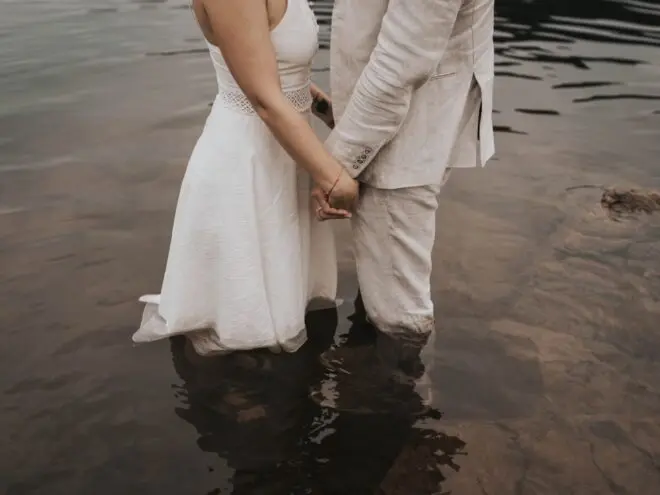Wedding Planning • 07/02/2024
Creating a Destination Wedding Website: 7 Details to Include

Revivalist is a reader-supported endeavor and our posts may contain affiliate links. When you buy through links on our site, we may earn an affiliate commission.
Destination weddings in stunning locations are more popular than ever. If you’re planning a wedding abroad, you may already know a website is the easiest way to keep guests in-the-know. Since destination weddings require more planning to attend, it’s essential you get your website up and running with plenty of time to spare, including all the relevant information needed for guests to prepare for the trip. With some guests flying across the world, you don’t want to make a small mistake that can lead to a big setback. Instead, learn exactly which details you should include on your destination wedding website.
Why Do You Need a Destination Wedding Website?
Wedding websites have become the norm among modern couples. A wedding website provides a space to store all of the important details of your wedding. Once guests receive their invitation, they can go to your wedding website to RSVP and get more information about the wedding.
For a destination wedding, the details are even more important. Guests will need to book flights and accommodations, know when and where they need to be, how they should dress for the climate and more.

What to Include on Your Destination Wedding Website
Read on to make sure you have all of the necessary information on your website before you invite guests to your destination wedding.
1. The Location and Venue
You will probably have your location listed on your invitations, but it’s important to include all the details on your site, as well. If guests misplace their inviation, they’ll need to refer to your website.
Include the exact name and address of the venue, along with a link to the website and contact information in case your guests have questions. Be sure to include these details about each location if your ceremony, rehearsal dinner, reception or other events will be held at different locations.
You will also want to state upfront that this is a destination wedding and give the full city, state and/or country name. While guests should be able to tell from the venue’s address, avoid any confusion by stating directly that they are being invited to a destination wedding.
If possible, include a map of the venue and surrounding area so guests can familiarize themselves with the location in advance. If they are driving or renting a car while in town, they might want to know what else is around. For guests flying in, they’ll want to see how close the venue is to the airport.
2. Transportation Options
Transportation will be the first thing guests will need to figure out after receiving their invite. For some guests, the difficulty and cost of transportation may determine whether they attend. When planning a destination wedding, be ready to accept that some people will have to decline your invitation. Older relatives may not be up for travel, while those with small children may not want to find childcare or attend with their kids.
For those who do wish to attend, provide as much information as possible about their travel options. If the wedding is in another country, offer flight recommendations and airport details. Consider renting a bus to transport guests from the airport to your venue to make it easier.
If your ceremony is in driving distance, provide directions for the best route and tips for places to stop along the way. Also give instructions for parking or locating the venue if it requires special instructions. For example, some remote locations may not have street signs, while city venues may not have on-site parking available.
The more instructions you can provide in advance, the better!

3. A Detailed Schedule
A destination wedding can last anywhere from one day to one week. Be sure guests know exactly what to expect with a detailed wedding schedule. Organize your schedule day-by-day with the exact start and end times.
If you have pre- or post-ceremony events planned, like a welcome party or send-off brunch, have separate fields in your RSVP form where guests can indicate if they will attend. Some guests may not be able to attend the full multi-day event. Provide a schedule of what will happen each day so they can decide which events they’ll attend.
If your destination is in a different time zone, be sure to make the dates and times very clear to avoid guests arriving late.
4. How to RSVP
Before setting up the RSVP page of your website, decide what date you need a headcount by. Be sure invitees know that, due to the nature of the wedding being abroad, once the RSVP date has passed you cannot add them to the attendee list.
Try to have your website, complete with RSVP information, set up at least six months prior to the wedding. To make it as easy as possible, set up a form on your website guests can complete to let you know if they’re attending and who they’re bringing. This will give people plenty of time to check their schedules, take time off and book travel arrangements.
Additionally, you’ll want to have guests indicate in the RSVP form which parts of the event they will attend, whether they will need transportation (if available) and whether they will stay in the hotel you recommend or find their own option.

5. Accommodation Options
It’s important to let guests know where they should stay when traveling to your wedding. If your venue offers accommodations, reserve a block of rooms and let guests know they can make reservations to stay on-site.
You can also research highly-rated hotels nearby and provide guests with a list of recommendations. If you’re not sure which hotels to recommend, ask the venue for suggestions. They will be familiar with the local area and are typically comfortable offering up information to travelers. Not only can they ensure the hotel is close, but they can also make sure it meets your quality and budget needs.
6. How to Give Gifts
With a destination wedding, it’s not entirely feasible to ask guests to transport gifts abroad. Not to mention, that’s more weight in your luggage when your return home.
Avoid the hassle and baggage fees by telling guests what to do with gifts on your destination wedding website. Most couples will include their registry on their website with links to send the items directly to the couple’s home. You can also tell guests to bring gifts to the bridal shower, or host a small get-together when you return back home.
Since guests will spend a significant amount of money traveling to the wedding, many couples opt to not receive gifts for a destination wedding. Consider including a simple message on your website such as, “Your presence at our wedding is the only gift we need.” Others have requested guests donate to a designated charity in their honor or give the gift of money through registry sites like HoneyFund or Zola.

6. Frequently Asked Questions
No matter where you choose to host your wedding, your guests are bound to have questions. Avoid the emails, texts and phone calls by providing them with the answers before they ask.
Think about what your guests may want to know and do research beforehand to add to your website. It’s recommended to dedicate an entire page of your website to frequently asked questions.
Consider including these common questions for a destination wedding:
- What is the weather like?
- How many days should I plan to stay?
- What attractions can I see while in town?
- How much will a plane ticket cost?
- Do I need a passport?
- When should I book a flight/hotel room?
- Will I need to rent a car?
- What should I pack?
- What is the local currency?
- What is the area’s culture like?
- What meals will I be responsible for during my stay?
- Is there a time difference?
7. Dress Code
Like any wedding, you will want to include a dress code on your website. Consider the climate and terrain of your destination before settling on a dress code. For example, you may want a more relaxed dress code for a beach or desert wedding.
You can also provide extra tips for what to wear based on your experience with the destination. For example, you might recommend guests wear short sleeves or shorter dresses if the weather will be hot. On the other hand, a mountaintop venue as well as a seaside venue may get chilly at night, so guests should bring a sweater. If there will be walking involved, suggest more comfortable shoes and closed-toed options for women.
Planning Your Destination Wedding
Planning a wedding, especially one halfway across the world, can be stressful. Don’t let guests add to the craze with a barrage of questions and commentary. Instead, set up a destination wedding website where you can include all the information guests need to know, from the location and schedule to how to behave when they arrive.
This post was updated on July 7, 2024.
Subscribe to Our Weekly Newsletter
We would love to connect deeper with you!


